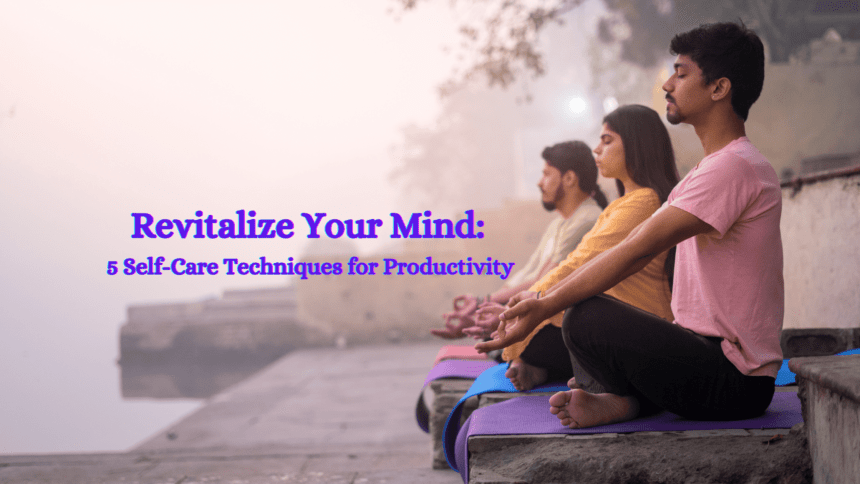Introduction
In today’s fast-paced world, the significance of self-care cannot be overstated. It is the cornerstone of mental health and productivity, allowing individuals to navigate the complexities of modern life with resilience and grace. This article explores five transformative self-care techniques designed to enhance mental well-being and productivity, providing a holistic approach to a balanced life.
1. Mindfulness Meditation

Understanding Mindfulness Meditation
Mindfulness meditation is a practice rooted in ancient traditions, now widely embraced in contemporary wellness circles. It involves focusing on the present moment, acknowledging and accepting one’s thoughts, feelings, and bodily sensations without judgment. This practice fosters a heightened state of awareness and presence.
Benefits of Mindfulness Meditation
The benefits of mindfulness meditation are manifold. It reduces stress, alleviates symptoms of anxiety and depression, and enhances emotional regulation. Regular practitioners often report improved focus and cognitive function, contributing to increased productivity and overall mental clarity.
How to Practice Mindfulness Meditation Daily
To incorporate mindfulness meditation into your daily routine, start with short sessions. Find a quiet space, sit comfortably, and focus on your breath. Allow thoughts to come and go without attachment. Gradually increase the duration as you become more comfortable with the practice. Consistency is key to reaping the full benefits.
2. Physical Exercise

The Connection Between Physical Exercise and Mental Health
Physical exercise is not just beneficial for the body but also for the mind. Engaging in regular physical activity stimulates the release of endorphins, known as the brain’s feel-good neurotransmitters. This natural mood lifter can significantly reduce feelings of stress and anxiety.
Types of Physical Exercises for Mental Well-being
Different forms of exercise offer varied benefits. Aerobic exercises like running and swimming boost cardiovascular health and reduce anxiety. Strength training enhances self-esteem and cognitive function. Mind-body exercises such as yoga and tai chi promote relaxation and mental clarity.
Creating a Sustainable Exercise Routine
A sustainable exercise routine is essential for long-term benefits. Start by setting realistic goals and gradually increase the intensity of your workouts. Incorporate a variety of exercises to keep it interesting and engage different muscle groups. Consistency and enjoyment are crucial to maintaining a lifelong habit.
3. Adequate Sleep

The Role of Sleep in Mental Health
Sleep is a fundamental component of mental health. It allows the brain to rest and rejuvenate, processes emotions, and consolidates memories. Chronic sleep deprivation can lead to a host of mental health issues, including anxiety, depression, and impaired cognitive function.
Strategies for Improving Sleep Quality
Improving sleep quality requires a proactive approach. Establish a regular sleep schedule by going to bed and waking up at the same time each day. Create a relaxing bedtime routine, limit exposure to screens before bedtime, and ensure your sleep environment is conducive to rest.
Overcoming Common Sleep Disruptors
Common sleep disruptors include stress, irregular schedules, and environmental factors. Address these by practicing relaxation techniques such as deep breathing or progressive muscle relaxation before bed. Make adjustments to your sleep environment, such as using blackout curtains or white noise machines, to minimize disturbances.
4. Healthy Nutrition

Nutritional Impact on Mental Health
The food we consume has a profound impact on our mental health. A diet rich in nutrients supports brain function and emotional stability. Conversely, poor nutrition can exacerbate mental health issues and impair cognitive abilities.
Key Nutrients for Mental Clarity and Stability
Certain nutrients are particularly beneficial for mental health. Omega-3 fatty acids, found in fish and flaxseed, support brain function and reduce inflammation. B vitamins, abundant in leafy greens and whole grains, enhance mood and energy levels. Antioxidants from fruits and vegetables protect against oxidative stress.
Crafting a Balanced Diet
To craft a balanced diet, focus on whole, unprocessed foods. Include a variety of fruits, vegetables, lean proteins, and healthy fats. Hydration is also crucial; aim to drink plenty of water throughout the day. Mindful eating practices, such as savoring each bite and listening to your body’s hunger cues, can further enhance the benefits.
5. Social Connections
The Psychological Benefits of Social Interactions
Human beings are inherently social creatures. Meaningful social connections provide emotional support, reduce feelings of loneliness, and increase overall happiness. Engaging with others fosters a sense of belonging and community, essential for mental well-being.
Building and Maintaining Meaningful Relationships

Building meaningful relationships requires effort and intention. Engage in activities that interest you, where you can meet like-minded individuals. Show genuine interest in others, listen actively, and offer support. Maintaining relationships involves regular communication and acts of kindness.
Navigating Social Challenges and Anxiety
Social interactions can be daunting for some, especially those with social anxiety. Gradually expose yourself to social situations, starting with small gatherings and working up to larger events. Practice relaxation techniques to manage anxiety, and seek professional help if needed to develop coping strategies.
Integrating Self-Care into Daily Routine
Scheduling and Prioritizing Self-Care
Integrating self-care into your daily routine requires planning and commitment. Schedule dedicated time for self-care activities, just as you would for work or other responsibilities. Prioritizing self-care ensures it becomes a non-negotiable part of your day.
Combining Multiple Self-Care Techniques for Synergistic Effects
Combining different self-care techniques can amplify their benefits. For example, practicing mindfulness meditation after a workout can enhance relaxation, while a nutritious diet supports better sleep. Experiment with various combinations to find what works best for you.
Tracking Progress and Adjusting Practices
Tracking your progress helps maintain motivation and identify areas for improvement. Keep a journal of your self-care activities and their effects on your mental health and productivity. Adjust your practices as needed to ensure they continue to meet your needs and goals.
Overcoming Barriers to Self-Care
Identifying Common Obstacles
Common obstacles to self-care include time constraints, lack of motivation, and feelings of guilt. Recognize these barriers and understand that self-care is not a luxury but a necessity for overall well-being.
Practical Solutions to Self-Care Challenges
Practical solutions involve time management and setting realistic goals. Break self-care activities into smaller, manageable tasks. Enlist the support of friends or family to stay accountable. Remind yourself of the long-term benefits to overcome feelings of guilt or indulgence.
Staying Motivated and Consistent
Staying motivated requires a strong sense of purpose and regular reflection on your progress. Celebrate small victories and remind yourself of the positive changes self-care brings to your life. Consistency is achieved through routine and a commitment to your well-being.
The Long-term Impact of Self-Care
Sustained Benefits for Mental Health
Consistent self-care practices offer sustained benefits for mental health. They build resilience, improve emotional regulation, and foster a more positive outlook on life. Over time, these practices become ingrained habits that support overall well-being.
Enhancing Productivity Through Self-Care
Self-care is directly linked to productivity. When mental health is prioritized, cognitive function improves, leading to better focus, creativity, and efficiency. This, in turn, enhances performance in both personal and professional spheres.
Real-life Examples of Successful Self-Care Practices
Real-life examples of successful self-care practices abound. From busy executives who swear by morning meditation to athletes who prioritize nutrition and sleep, the common thread is the recognition of self-care as essential to their success and happiness.
Conclusion
Embracing self-care as a lifestyle is a powerful step towards achieving mental health and productivity. By integrating mindfulness meditation, physical exercise, adequate sleep, healthy nutrition, and social connections into your daily routine, you can cultivate a balanced and fulfilling life. Prioritize self-care, and watch as your mental well-being and productivity soar.
For more Health related content follow Humstory.













